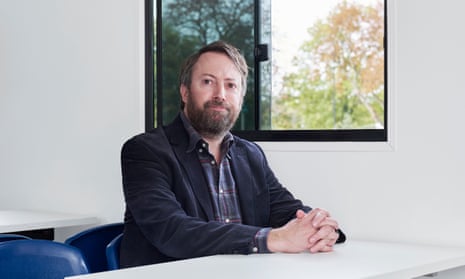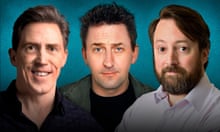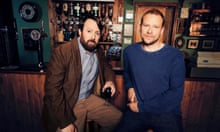An empty canteen trailer on a sports field in Chiswick is the rather sterile setting for my interview with David Mitchell, the comic actor and Observer columnist. The location couldn’t be less atmospheric if we were in outer space, though Mitchell exudes a displaced solidarity that makes me feel almost… at home.
He says that canteens on TV sets used to be housed in refitted double-decker buses, but now they’re functional white trailers, the kind of places you’d go to give blood rather than eat lunch. Such small signs of cultural decline are, of course, what Mitchell specialises in denouncing in his signature baroque, mock-rantish fashion.
In his column for this newspaper and in the comic riffs for which he is known on shows such as QI or Have I Got News For You, he is a satirist of crass innovations, a poet of minor irritations. But in Dishonesty Is the Second-Best Policy, a collection of his columns from the past three years, Mitchell has reached a more macro-scale judgment. His ire is aimed not at film-set canteens but at the world at large, or at least the British part of it. In his opinion, he writes, Britain is now a country where things are “generally getting worse”.
That’s not an exceptional observation. Perhaps the majority of people, exhausted by the Brexit drama, depressed by the quality of our political leaders, think that the country is heading dogs-wards. But I wonder by which means – empirical analysis or personal observation – Mitchell has arrived at this conclusion.
As soon as I ask the question, he acknowledges the possibility that he might be wrong.
“It might be that I’m getting older – and as people get older, I imagine they get more pessimistic. It’s part of the mortality psychological coping strategies. It’s quite a common thing for people who are properly old to be sort of sick of the world.”
Before I can point out that he’s only 45, he adds: “I’m a bit young to be finished with the world.”
This is true. Mitchell is now the age that his comic persona has always been. Right from the start of his career he seemed, by comparison with his peers and, indeed, his long-term comedy partner Robert Webb (who’s actually a couple of years older), like a middle-aged man in his outlook and delivery. His was the pedantic, put-upon conservative with a small “c”, frustrated with the superficiality of modern trends, comically thwarted and superbly enraged. It was as if he had skipped the young, free and single years and gone straight to a dyspeptic midlife crisis – albeit an ironic one.

But now the world has caught up with him and, in Mitchell’s words, it is in “moral and economic decline”. He wishes the internet didn’t exist, and he reckons proportional representation, a steep hike in MPs’ pay and stiff taxes on carbon-producing activities are the solutions to the current malaise.
He apologises in the book’s opening essay for his presumption in writing a “trite manifesto”, but argues it’s the least he can do if he’s going to continue moaning. “And my resolve to do that,” he adds, “is unshakeable.”
Given that he lives a very comfortable life in a leafy corner of north London where the infamous metropolitan liberal elite tend to congregate, and is professionally successful, happily married to his fellow panel show regular and former Observer columnist Victoria Coren, and the proud father of a young daughter, does he really feel the angst that he describes?
“Fundamentally, I think I do feel it,” he says. “It’s true that as I walk out of my house in a nice quiet street and go to a nice cafe five minutes’ walk away, I have no reason to have these apocalyptic musings.”
However, he says that his sense of the external world is shaped not by experience but by the news and social media. In this, he’s not alone. Most of us, these days, acquire our information by similar means, but he is as concerned about the medium as he is by its message.
“As someone who doesn’t say much on social media, I’m nevertheless so aware of it, aware of the passing rages and injustices, and injustices caused by other people’s sense of injustice on the internet.”

It’s these echo chambers of social outrage, rather than the cause of the outrage, that appear to bother him most. As much as he is ardently in favour of remaining in the EU, what really troubles him is the toxic nature of the debate, and the manner in which division has become embedded in mutual animosity. By nature, he’s a polite chap, alive to the other’s point of view. That said, there is one person for whom he is inclined to suspend his more nuanced rules of engagement. David Cameron really seems to get his goat. Why him, in particular?
“The Brexit referendum is the worst thing he’s done,” he says, “but I didn’t like him before that. He’s a really interesting symptom to look at. He’s the sort of symptom from which a diagnosis can be derived. Obviously, he’s not an idiot, but the mixture of the poshness, the plausibility, the central slipperiness – he’s the worst person to be in a position of supreme power in a trillion-dollar economy. His referendum plan elevated the importance of Tory party unity over the prosperity of Britain and the stability of Europe. We’ve got to not have the system that rewards that behaviour and that sort of instinct.”
It doesn’t help that the former Tory leader was educated at Eton, an institution for which Mitchell, himself the product of a minor public school, once felt a certain fondness.
“I used to like old-fashioned things like classic cars,” he says. “And that’s fine because when they’re fading into the past and the future is perhaps less picturesque but fairer, then you can enjoy reminiscing about the picturesque.”
When Britain had a series of state-educated prime ministers, from Harold Wilson to John Major, Eton, by his reckoning, became a harmless school. “But now,” he says, “that period feels like a weird phase of meritocracy.”
Cameron- and Eton-bashing aside, Mitchell is not someone who usually places a target in his sights. Instead he tends to construct elaborate works of lateral thinking in his columns, moving from the general to the particular and back again, in amused pursuit of the perfect riff. While he likes to be right as much as the next opinionated person, in this age of political turbulence and Twitterstorms he prefers to be funny.
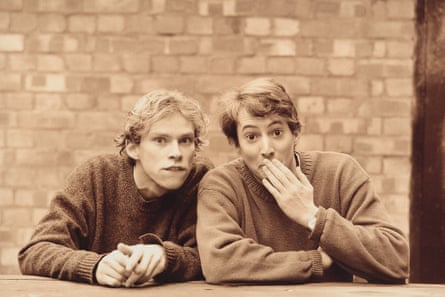
Still, he increasingly questions why he’s writing a column after 11 years on the job. What he continues to savour, though, is the immediacy and reliability of a column by comparison with television, where most ideas die a long and anonymous death, never seeing the light of an audience’s eyes.
“It goes down well in the TV world if you’ve got a column,” he says. “They’re aware that they haven’t got complete monopoly on your ability to express yourself publicly.”
Mitchell, it must be said, has seldom suffered a shortage of public expression on television. For the past 20 years he’s barely been off our screens. His first big break came in 2000 in a sketch show called Bruiser, in which he appeared alongside Webb and their old Cambridge Footlights friend Olivia Colman, star of, well, everything. Also present was Martin Freeman, of Sherlock and Bilbo Baggins fame.
Another of Mitchell’s Footlights contemporaries was the satirist John Oliver. There’s nothing like globally successful friends to put your own achievements in perspective. But he does not envy them their stratospheric rises. Unusually, perhaps, for someone who has attained a high level of recognition, Mitchell doesn’t want to go any higher. That said, he acknowledges that it’s politic to affect ever greater ambition, to be seen always to want more, if only in order to “cling on” to what you’ve got.
He calls the idea that if you’re not moving forward, you’re moving backwards “business bullshit speak”. The truth, he says, is that if you’re not moving forward, you might just be stationary.
“Any physicist would accept that. And I wish to remain stationary. My ambition as a teenager was to do what I do for a job in almost exactly the way I do it. And that’s what I want to continue to do as a job until I retire. I don’t want to be a film star and I don’t want to go to Hollywood.”
So he has reached a rare state of professional contentment, except in his case it’s an anxious kind of contentment because he is fundamentally an anxious kind of person. For many years he controlled his various irrational fears through analysing statistical likelihood. “I managed to get myself to a place where the thing I was frightened of didn’t have to be impossible – I could console myself with the thought that it was just vanishingly unlikely.”
That worked until he had a child, his and Coren’s four-year-old daughter, Barbara. Now, he says, he’s back to “needing the bad thing to be absolutely impossible”.
Perhaps because he’s such a natural observational comedian, he talks easily about his private life, while conscientiously registering a desire for privacy. A further problem is that he’s spoken in the past with striking candour about the details of his personal life, as well as writing a superior celebrity memoir, Back Story.
The unglamorous bachelor flat where he used to live in Kilburn, north-west London, became a staple reference in interviews, in which he would reflect on loneliness, his lack of experience with girlfriends and much else that most celebrities would carefully excise from the business of image projection.
He did it partly because he’s an incurable anecdotalist but also to play up his comic persona – the one most fully embodied by Mark Corrigan, his character in the long-running Channel 4 comedy Peep Show: single, nerdy, desperate, prone to brilliant comic tirades. But the distance between the image and the reality was uncomfortably close.
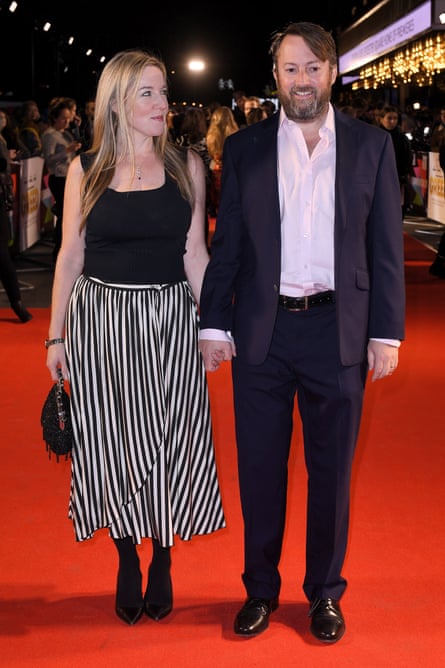
And then he met Coren, fell in love, and realised he’d met his soulmate. She was keen, too, but in a difficult period in her life, she went out with someone else. He waited for three years, until she realised that Mitchell was the man for her. What impresses about that story is the waiting. It sounds like something from a distant era, many lifetimes before the instant gratification of the internet.
It’s more like something out of a medieval tale of courtly love, a moral of romantic struggle and triumphant belief. From being the lovable square that people secretly pitied, he became a partner in a fine romance that others openly envied. He’s not unaware of the transition or how he and Coren are perceived.
“From the start, people I didn’t know were very warm about Victoria and I being together, and that’s a lovely feeling. A performer is warmed on a deeper level by strangers’ approval because that’s why we got into it. But neither of us wants to live our relationship in the public eye. We’re happily married but don’t want to project that to people like, look, we’ve got something right!”
Nonetheless it’s clear that he, like Coren, remains deeply in love, seven years on from their wedding. As celebrity marriages are like dog years – you have to multiply them by seven – they’re practically about to celebrate their golden anniversary. And with two sitcoms on the go – Simon Blackwell’s Back, in which he stars alongside Webb once more, and Ben Elton’s Shakespearean farce Upstart Crow (which opens in the West End in a stage version next year) – and a busy panel-show profile, he is, by his own estimation, tremendously happy at the moment.
But as any pessimist knows, there’s only one place to go from tremendously happy. “Exactly!” he says. “It’s a dangerous point on the narrative arc.”
Mitchell is not slow to recognise his good luck, and perhaps because he is such an obvious enthusiast, someone who’s not interested in playing it cool or affecting indifference, he’s not resented for it, either. My guess is that he will remain where he is, highly visible and cheeringly happy. After all, any physicist would accept that.
